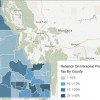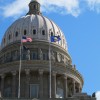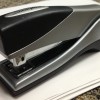Background
This page is no longer being updated. For ongoing coverage of this topic, go to Boise State Public Radio’s website.
In March 2013, lawmakers signed off on a partial repeal of Idaho’s personal property tax. The bill was backed by groups that represent local government and school officials, and was much less sweeping than the full repeal favored by the Idaho Association of Commerce and Industry.
Among other provisions, the approved bill exempts the first $100,000 worth of personal property owned by every business in the state in each county of operation. It also exempts all business personal property with an acquisition price under $3,000. The bill relieves 90 percent of Idaho businesses from paying the tax while retaining 80 percent of the tax revenue.
Explaining Idaho’s Personal Property Tax
Local taxing districts collect taxes on two kinds of property, real and personal property. Real property is, more or less, real estate. It’s the big, immovable stuff, like land and homes and buildings.
Personal property, on the other hand, describes the smaller, tangible things we all own. It’s your furniture, your clothing, your bicycle. Idaho’s personal property tax only applies to personal property used for business purposes. A state tax commission guide describes it this way:
“Taxable personal property consists of items used commercially, such as furniture, libraries, art, coin collections, machinery, tools, equipment, signs, unregistered vehicles, and watercraft. Taxable personal property also includes items used commercially for convenience, decoration, service, or storage. Examples are store counters, display racks, desks, chairs, file cabinets, computers, typewriters, office machines, and medical/scientific instruments.”
Complicating that, Idaho has exempted certain categories of commercially used personal property from taxation. For example, machinery and equipment used strictly for agricultural purposes are exempt. The personal property tax also does not apply to livestock, business inventory, and certain hospitals’ medical equipment, among other things. What’s more, the definition of taxable personal property can vary somewhat from county to county.

Georges Gobet/AFP/Getty Images / Fred Dufour/AFP
A harvesting combine, which is considered personal property, is tax-exempt in Idaho. A restaurant's wine glasses, on the other hand, are taxable personal property.
How much money does the personal property tax bring in?
There are three main sources of tax revenue in Idaho: income, sales and property taxes. There are also more than a dozen smaller tax categories, such as the state’s cigarette, beer and wine taxes. Nearly all property tax revenue collected in Idaho is collected and spent by local governments.
Together, Idaho’s income, sales and additional tax revenue totaled more than $3.26 billion in the 2012 fiscal year (which ran from July 2011 through June 2012). Property tax revenue totaled $1.43 billion in the 2012 calendar year. With a little math, we can gather that revenue from property taxes comprises about 30 percent of the total tax revenue collected by state and local government.
Where do personal property tax collections fit into that total tax revenue picture? In 2012, revenue from the personal property tax totaled $141 million, according to the Idaho State Tax Commission. That means about 10 percent of property tax revenue comes from the personal property tax. That’s about 3 percent of total tax revenue collected in Idaho.
Personal property tax revenue can be thought of as a portion of the state and local tax revenue pie. It can also be considered in the context of state spending on key public services.
For example, the $143 to $153 million in personal property tax revenue collected in 2012 dwarfs the magnitude of the controversial cut in Medicaid funding authorized by the Idaho Legislature in 2011. That cut saved the state $35 million in ongoing general fund revenue. About $1.5 million dollars of that funding was restored in 2012.
Why get rid of the personal property tax?
The state’s most prominent business lobby, the Idaho Association of Commerce and Industry (IACI), is the seat of opposition to the personal property tax in Idaho. The association’s argument centers on the impracticalities of the tax. “It is one of the most difficult to administer and comply with for government and business alike,” reads IACI’s introduction to the personal property tax.
The association maintains that getting rid of the personal property tax will result in economic growth. “It is a barrier to economic development,” IACI’s statement about the tax continues, “and studies indicate that the elimination of the tax not only benefits business, but will increase the personal income of Idaho citizens.”
Many lawmakers and others who favor doing away with the personal property tax maintain that the tax is unfair because it is unevenly applied. They also note that businesses wind up paying two taxes — sales tax, which goes to state coffers, and the personal property tax, which is collected and spent locally — on many of the items businesses use, day to day.
Why abolishing the personal property tax is controversial
There are a lot of reasons why doing away with a particular revenue source might produce consternation. Getting rid of the personal property tax directly affects Idaho’s taxing districts — there are 1,105 of them, and 964 levied property tax in 2012 — by taking away one of their sources of income.
Property tax revenue, on the whole, made up about a quarter of local government general revenue in 2010. That average masks a great deal of variation across local taxing districts, with respect to personal property tax collections. Some taxing districts rely heavily on personal property tax revenue, while others take in very little. The amount depends on the kind of industry that exists within a district.
Cities and counties have proven to be the most codified opposition to repealing or phasing out the personal property tax. They claim that, without personal property tax revenue, they will struggle to meet their statutory and constitutional responsibilities. “Eliminating the business personal property tax without providing replacement funding will shake the foundation of our local communities,” reads a pamphlet created by the Idaho Association of Counties.
Some lawmakers argue that the personal property tax repeal will come about through a tax shift. In other words, they say the dollars lost by local taxing districts will have to be replaced with dollars from some other revenue source, such as a reimbursement from state coffers.
However, Senate President Brent Hill (R-Rexburg) has circulated a letter to local leaders suggesting otherwise. The letter indicates that one proposal under consideration would not reimburse local governments for lost revenue, if the personal property tax is repealed. Hill’s letter indicates that plan would also prohibit local governments from raising levy rates on real property in order to make up the lost tax dollars.
Idaho would be in the minority of states if it were to abolish the personal property tax, according to research conducted by the Idaho State Tax Commission. That research finds that 14 states have done away with the personal property tax, or are in the process of doing so.









